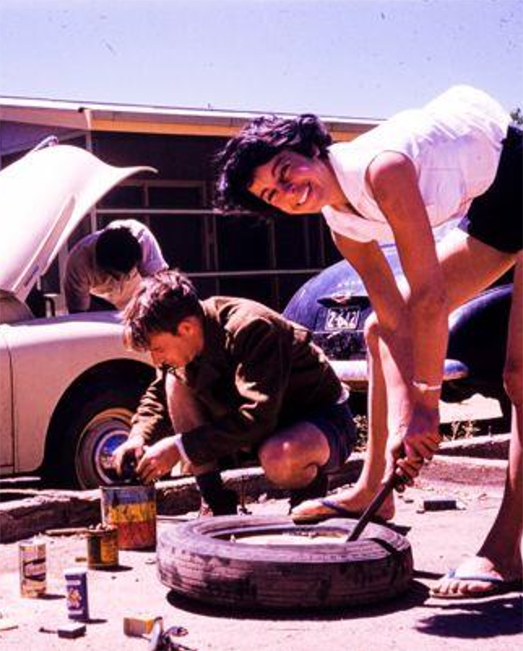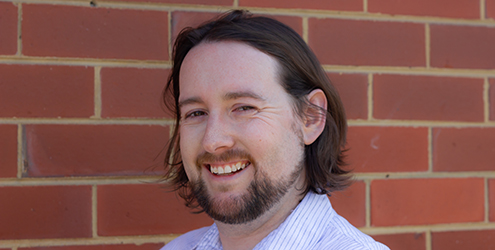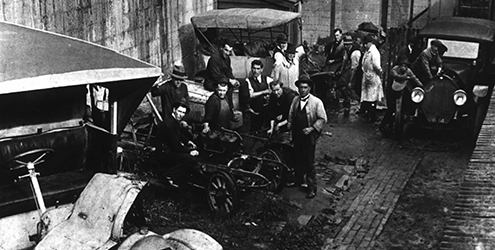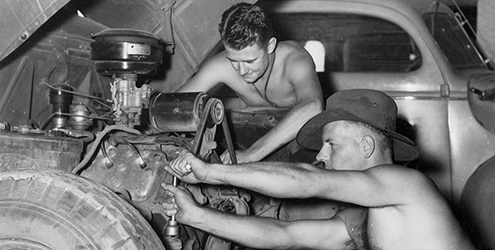Community
Copyright@ Australian Catholic University 1998-2026 | ABN 15 050 192 660 CRICOS registered provider: 00004G | PRV12008
Copyright@ Australian Catholic University 1998-2026 | ABN 15 050 192 660 CRICOS registered provider: 00004G | PRV12008

Picture a cramped automotive garage in suburban Australia in the 1960s. The prized machine – a Holden or maybe a Ford – has its bonnet lifted, a bevy of blokes hunched over the engine bay while the mechanic’s grease-stained hands work their magic.
When Michael Pearson was growing up, his father would tell him stories that conjured such imagery, fuelling his fascination for the car-centred culture of the time.
“A lot of my dad’s best friends were mechanics and he’d tell me these incredible stories about hanging out with them in their garage,” says Michael, a historian who completed his Doctorate of Philosophy at ACU in early 2022.
“From a historical perspective, I found these stories fascinating, and it eventually prompted me to dig a little further into the people entrenched within this culture.”
At the time, Michael was a burgeoning researcher with an interest in labour history. He quickly realised he had found an ideal topic for this PhD thesis.
“When I started to look into the history of motor mechanics in Australia more broadly, there was something about their work that seemed so interesting to me, and I realised there was this real gap in our understanding,” he says.
“Most people who write about cars and mechanics do it because they’re interested in the technology, but for me, I was interested in the people, so my passion was to write about the people involved and to explore the social and human elements of their stories.”
In late 2021, after years of painstaking research, Michael completed his PhD thesis: Grease Monkeys: A History of Australia’s Motor Mechanic Trade, 1900-1970. The research provides insights into a group of workers whose stories rarely see the light of day.

Dr Michael Pearson
“Finding stories of individual mechanics was quite a struggle, but I was fortunate to be studying full-time at ACU under scholarship, so I had the time to dedicate to digging down at a really deep level,” says Dr Pearson, who now works as a policy officer with Infrastructure Victoria.
“It was incredibly rewarding to find these stories and bring them to light, while also discovering that some of the working class imagery associated with the mechanic trade hides a much more complex history.”
The title of Michael Pearson’s thesis invokes the colloquial term ‘grease monkeys’, a name used to describe motor vehicle mechanics from the 1930s.
The first car arrived in Australia three decades earlier, in 1900, signalling a new era in which workers with technical skills – engineers, blacksmiths and the like – turned to automotive repairs.
“There was this idea of the mechanic who can fix just about anything,” says Dr Pearson, noting that ‘grease monkey’ was originally a term of endearment.
“With the demands of conflict, mechanics were vital to the war effort. Not only did they help to repair machinery; they also had the ability to jump from technology to technology, almost like a monkey swinging from tree to tree.”
In those early decades, the car was still an elite status symbol, a luxury reserved for the few. The new mechanical trade, however, was open to a wide variety of people: both men and women across social classes.
“There was this huge crossover of people fixing cars and there was very much this respect of their complex technical knowledge,” says Dr Pearson, who notes that the early mechanics had ample opportunity to progress into higher-paying occupations.
He cites the story of Monty Page, a Grafton-based mechanic who repaired the car of retail baron Mark Foy so quickly that Foy immediately offered him a job in Sydney. According to his doctor-turned-politician brother Earle, Monty’s mechanical genius was akin to the skills of a medical doctor.
“He was naturally sensitive to the peculiarities of mechanical intestines,” Earle Page later reflected on his brother’s skill in his autobiography. “When he diagnosed a disease of automation he displayed a sixth sense and when he operated he did so with precision.”

Motor mechanics students in 1918. Photo from RMIT Archives
With time, however, the view of mechanics shifted from being regarded as automotive ‘surgeons’ to the quintessential representatives of the working class.
“One thing I discovered through writing the thesis is that what has changed over time isn’t so much the ability of mechanics, it’s the way that we educate them and the way that we define the skill,” says Dr Pearson, adding that by the 1950s, ‘grease monkey’ had become a term of disparagement.
“Technologies came along and these brought positive improvements to cars, but they were also used deliberately to reduce the level of skill mechanics require to do their work, and this de-skilling had as much to do with class and social struggles as it did with actual technical expertise.”
So, how did mechanics go from respected technicians with prospects for social mobility to exploited and maligned workers with little chance of career advancement?
It begins with what Michael Pearson describes as a ‘class struggle’.
In the early 1900s, when cars were an elite technology, car clubs and organisations were quickly formed across Australia to serve the interests of motorists.
“Motorists quickly saw the value of using their power and status to put pressure on governments and business to create conditions that suit motorists and their needs,” Dr Pearson says. “A key part of that was the needs of their cars in terms of ongoing maintenance and repairs.”
At the same time, motor mechanics failed to organise themselves through union membership and therefore struggled to develop a cohesive identity. In the long run, this proved costly, as mechanics faced multiple challenges in defending their status.
In his research, Dr Pearson cites the rising resentment amongst motorists who relied on mechanics to fix their cars.
“Leaving their expensive machines in the hands of those who otherwise would never be able to afford to touch one disrupted their class sensibilities,” he writes, citing depictions in pro-motorist publications of mechanics as “failures in their own trades who were now seeking to exploit motorists”.
Alongside this concerted campaign by motorists, the trade was de-skilled through those aforementioned technological advancements, as well as changes in the educational system, making mechanics easier to exploit with low wages.
Then, in the post-war period, came a culture shift that further entrenched the trade as the domain of working-class men.

Truck maintenance in Darwin. Photo from State Library of Victoria
“By the 1950s, there’s this real revolution in culture that occurs as cars go from being a luxury item to something that is essential in society,” says Dr Pearson, citing the car-centric development of cities as a symptom of this cultural change.
“Suddenly, cars are no longer reserved for the rich, but they’re still a fascinating technology, and there’s this generation of young men who grow up with this idea of working on cars and spending time in garages hunched around a vehicle, whether it’s the handyman at home, or at professional garages where people worked on cars … it became very much part of this emerging male and youth subculture.”
In setting out on his task to record the history of the motor mechanic trade in Australia, Michael Pearson strived to “elevate the ordinary mechanic as a figure deserving of contemplation and respect”.
He begins the thesis with a description of a mechanic named Mick, described in an essay titled ‘Ode to my mechanic’, by writer Sasha Shtargot.
Dr Pearson describes Mick as “a timeless type, a living example of the ‘grease monkey’ stereotype so often associated with motor mechanics”.
In tracing the origin of this stereotype through his research, Dr Pearson aims to flesh out its historical context and give it greater meaning. He concludes that the depiction of Mick the mechanic is “a romantic image, but also a tragic one”.
“Motor mechanics might have been present at their own making as a class,” Dr Pearson writes, “but they also presided over key elements of their own proletarianisation, making themselves ever more vulnerable to exploitation.”
Equally tragic is fact that, in the years to come, with the rise of electric vehicles necessitated by the threat of climate change, so-called ‘grease monkeys’ like Mick the mechanic will be a rare species.
“It’s an image of a lost world in a lot of ways,” says Dr Pearson, who pays tribute to maintenance workers and repairers who provide a service to society, while also being hopelessly exploited by it.
“I think of my father’s best friend who was a motor mechanic, and he still works on cars in his spare time, but he left the trade many years ago because the ways he had been taught to work on cars, it just wasn’t relevant anymore.
“It is quite tragic that a trade that was for a long time an industry of promise for so many people has been whittled away to the point where one day, it could be a relic of the past.”
Learn more about where higher degree research at ACU could take you.
Copyright@ Australian Catholic University 1998-2026 | ABN 15 050 192 660 CRICOS registered provider: 00004G | PRV12008